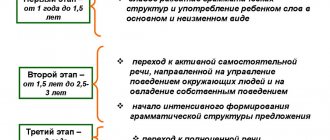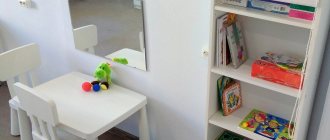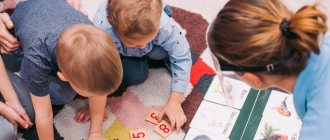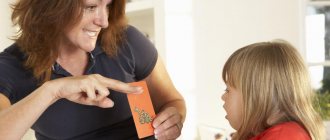Formation of vocabulary in preschool children
Nadezhda Melnikova
Formation of vocabulary in preschool children
| A. Koni: |
| The word is one of man's greatest weapons |
Modern life dictates its own laws. Good speaking is an art that needs to be learned. Both a person’s social status and professional career depend on this. Many years of experience working with children with speech development problems confirms that the earlier a child masters good speech, the fewer problems he has with learning at school, the less often difficulties arise.
The task of adults is to help the baby master speech. But to do this, you need to clearly understand the entire path of a child’s normal normal speech development, know the laws of this process and the conditions on which its successful occurrence depends.
The development of a child’s vocabulary can be divided into several stages:
Stage 1 – pre-verbal. Lasts from the birth of the child until the time of the appearance of the first conscious words - up to approximately 12 months. This is the period of formation of speech understanding. The child turns his head when he is shown well-known objects, toys, performs simple movements (makes “okay”, waves his hand “goodbye”), although he still cannot describe the actions he is performing in words.
Stage 2 (from 1 year) – verbal. This is the stage of active acquisition of vocabulary of the native language. In the process of vocabulary formation, there is not only an increase in the number of words in a child’s speech, but also a clarification of their meanings. At first, the meaning of the word is polysemantic, amorphous and vague. It can have several meanings and denote an object, a sign, and an action. For example, the word “bi-bi” can mean a car, a bicycle, or anything that rides. The word is accompanied by a certain intonation and gestures that clarify its meaning.
Stage 3 (from 2 to 3 years) is the most favorable stage in the development of a child’s speech - mastering the rules and norms of the native language. An important indicator of speech development at this stage is the appearance of phrasal speech by the age of two. In the child’s active speech, various parts of speech appear: verbs, nouns, adjectives, numerals, adverbs. The active development of vocabulary during this period increases the child’s communication abilities. When a child masters a sufficient vocabulary, coherent speech and grammatical structure of speech begin to develop, and the sound side of speech improves.
Stage 4 (from 3 years old) - mastering the morphological system of the Russian language. At this age, there is a significant increase in vocabulary, the child has questions about the meaning of words, and the child himself tries to explain words based on their meanings. By the age of four, correct sound pronunciation, the intonation side of speech, as well as the ability to express a question, request, or exclamation with intonation are formed. By this point, the child has accumulated a certain vocabulary, which contains all parts of speech. During this period, the formation of monologue speech occurs. The child is already able to tell not only directly perceived circumstances, but also what was perceived or said earlier.
By older preschool age, clarification of the semantic meaning of words is gaining momentum. Children develop a great interest in the word and its meaning. The vocabulary of an older preschooler is actively enriched by words invented by the children themselves. Word creation becomes one of the important features of children's speech. Children of senior preschool age master coherent speech, which is a powerful reserve of their mental development.
Taking into account the above, we can say that by the senior preschool age, the child masters all the basic models of his native language, and the vocabulary of a preschooler of this age can be considered as a national language model.
Vocabulary disorders in preschool children
1. The predominance of the volume of the passive vocabulary over the active one;
2. Inaccurate use of words, the presence of verbal paraphasias;
3. Difficulties in updating the dictionary;
4. Lack of formation of semantic fields (semantic substitutions of words);
5. Difficulties in forming word-formation models;
6. Difficulties in forming antonyms and synonyms;
7. Difficulties in identifying essential differential features of words;
8. Limited vocabulary, which complicates the communication process
The main directions of work on the formation of vocabulary in preschoolers
• Expansion of the vocabulary in parallel with the expansion of ideas about the surrounding reality, the formation of cognitive activity (thinking, perception, attention, ideas, memory, etc.);
• Clarification of the meaning of words;
• Formation of the semantic structure of a word, organization of semantic fields, lexical system of the native language;
• Activation of the dictionary, improvement of word search processes, translation of words from a passive to an active dictionary
• Formation of word formation.
• Expanding the stock of synonyms and antonyms
• Formation of the correct use of words in coherent speech.
Downloadable textbooks for kindergarten and primary school
The function is available for registered users. Registration Information How to add your materialIt is completely free to download interesting and useful material for children and the whole family: materials for kindergarten and school, everything for video and photo editing, culinary recipes, films and cartoons for family viewing, entertaining and educational computer games.
Materials for downloading are posted on the detskieradosti.ru resource by ordinary site visitors who want to share with you completely free of charge. For your information, information will be useful (without sending paid SMS) Selection of materials Letters and numbers
| School clipart | Card files of walks - September, October, November | Playing game. Math for kids | Clipart – Halloween | |
| Folder promotion for Older People's Day | Cheat sheets for first graders | Mr. Samodelkin | Children's cooking | Autumn and summer holidays |
| Home » Files » |
| In the materials section: 2168 Materials shown: 1-15 | Pages: 1 2 3 … 144 145 » |
| Stories, poems Salute, pioneers! A collection of works by Soviet writers about the life of the pioneers of our country. More details Schoolchild's library | | Added by: letitvlavasaf | Date: Yesterday | Updated: | Comments (0) * |
| The Legend of a Faithful Friend A story about the adventures of children from the primitive Tazh tribe, which could have lived in the foothills of the Tien Shan and in the steppes of Central Asia in distant Neolithic times. More details Schoolchild's library | | Added by: letitvlavasaf | Date: 10/15/2021 | Updated: | Comments (0) |
| Book of a young designer Volume 1 The book contains descriptions of various models and devices. Descriptions of structures that have already been built, carefully tested and work well were selected for the book. More details Schoolchild's library | | Added by: letitvlavasaf | Date: 10/14/2021 | Updated: | Comments (0) * |
| Mastering literacy Workbook for classes with preschool children Read more Learning to write | | Added by: letitvlavasaf | Date: 10/13/2021 | Updated: | Comments (0) * |
| In the Land of Unlearned Lessons A book about a would-be student, a poor student who finds himself in a magical land full of adventures and dangers that he will have to overcome in order to return home again. More details Schoolchild's library | | Added by: letitvlavasaf | Date: 10/13/2021 | Updated: | Comments (0) * |
| Mouse Mytsik Funny and sad adventures of a gray mouse, told by himself Read more Preschooler's library | | Added by: letitvlavasaf | Date: 10/08/2021 | Updated: | Comments (0) * |
| Zanimatika Zanimatika is the cheerful little sister of arithmetic. It will help your children not only quickly memorize numbers and solve simple problems with them, but will also give them the first ideas about the theory of relativity, space, time and, most importantly, teach them to think creatively and find the right solutions both in arithmetic and in life. Read more Math Activities | | Added by: letitvlavasaf | Date: 10/06/2021 | Updated: | Comments (0) * |
| Kashtanka Kashtanka is a dog cross between a dachshund and a mongrel. One day, she lost her owner. The search did not yield any results, so the poor thing simply fell asleep under an unfamiliar entrance. The story shows how important it is to be loyal. Kashtanka’s new life was full of interesting events, the dog did not experience hunger, but she still returned to her owner because she loved him. More details Schoolchild's library | | Added by: letitvlavasaf | Date: 10/06/2021 | Updated: | Comments (0) * |
| The Endless Fairy Tale The collection “The Endless Fairy Tale” is compiled based on materials from the pre-revolutionary magazines “Firefly”, “Good” and many others, published under the editorship of the wonderful children's writer Alexander Fedorov-Davydov. The book also includes works by writers of the twentieth century: Mikhail Prishvin, Leonid Belsky, Dmitry Kaigorodov, Ivan Belousov and others; poems, stories and essays by various authors about animals. More details Schoolchild's library | | Added by: letitvlavasaf | Date: 10/05/2021 | Updated: | Comments (0) * |
| The tragedy of wild animals We will never see many animals and birds - 600 species of animals are now on the verge of complete destruction. To prevent this from happening, it is necessary to instill in every person a taste for knowledge of nature and a sense of personal responsibility for its preservation. More details Schoolchild's library | | Added by: letitvlavasaf | Date: 10/05/2021 | Updated: | Comments (0) * |
| Nedopesok A story by Russian writer Yuri Koval about the escape of a young arctic fox named Napoleon the Third from a fur farm. One of the most famous works of the writer. The magazine version was published in the magazine “Koster” in 1974, and the story was published as a separate edition in 1975. More details Schoolchild's library | | Added by: letitvlavasaf | Date: 10/05/2021 | Updated: | Comments (0) * |
| Entertaining Geography The manual invites students to look beyond the pages of a school textbook to get a lot of interesting and useful information on geography. The guys will find amazing and mysterious facts, entertaining questions and assignments, quizzes and crosswords. The manual can be used for work in geography lessons and for extracurricular reading, as well as in preparation for Olympiads, quizzes, and competitions. It will help you prepare a report, essay, creative work. More details Schoolchild's library | | Added by: letitvlavasaf | Date: 10/04/2021 | Updated: | Comments (0) * |
| Learning to draw I want to become an artist The manual is dedicated to the development of creative drawing abilities in school-age children. The author offers a methodology for teaching drawing in accordance with the curriculum for schoolchildren recommended by the Ministry Read more Drawing, coloring | | Added by: letitvlavasaf | Date: 10/03/2021 | Updated: | Comments (0) * |
| Animal world Birds. Fish, amphibians and reptiles The book describes representatives of six classes of the animal kingdom. By reading it, you will learn about the life of various birds, lampreys and hagfish, sharks and rays, electric and other fish, newts, salamanders, frogs, turtles, crocodiles, snakes and many other amphibians and reptiles from all over the world. Read more Natural history | | Added by: letitvlavasaf | Date: 10/02/2021 | Updated: | Comments (0) * |
| Ivan Tsarevich and the Gray Wolf A beautifully designed book for reading with colorful illustrations. For primary school students. More details Schoolchild's library | | Added by: letitvlavasaf | Date: 10/01/2021 | Updated: | Comments (0) * |
1-15
16-30 31-45 … 2146-2160 2161-2168
Lexical dictionary for speech development in the middle group
Tatyana Vladimirovna Gorbatovskaya
Lexical dictionary for speech development in the middle group
Dear colleagues, maybe someone will laugh at my material, but someone will need it. After all, it often happens that in conversation with children we develop some kind of clichés, we use the same words and this does not make our speech colorful. Therefore, I bring to your attention this unique dictionary. I use it when making stories based on a picture or when explaining something.
Fruits
Nouns. fruit, apple, pear, plum, cherry, banana, tangerine, orange, lemon, tree, bush, peel, seed, seeds, juice, jam, marmalade.
Adjectives Green, red, orange, yellow, purple, big-small, large-small, sweet, juicy, crispy, ripe, tasty, hard-soft, heavy, rough, smooth. Bulk, rosy (apple, lemon, cherry, raspberry (juice, apricot, apple, peach (jam).
Verb. Grow, bloom, sing, bear fruit, collect, pick, wash, store, cook, prepare, grow, ripen, ripen, sell.
Berry
Nouns. Strawberries, currants, gooseberries, raspberries, lingonberries, wild strawberries, compote, jam, juice.
Adjectives Tasty, sweet, sour, boiled, dried, fragrant (strawberries, soft.
Verb. Collect, wash, cook, cut, dry.
Vegetables
Nouns. Carrots, radishes, cabbage, beets, tomato, onion, peas, cucumber, dill, zucchini, parsley, pumpkin, pepper, eggplant, garlic, lettuce, harvest, seeds, pod.
Adjectives Green, yellow, red, blue, red, juicy, round, oblong, strong, bitter, sweet, small, large, large, small, crispy, smooth, soft, vegetable (lettuce, pot-bellied (pumpkin, pimply, thick-skinned, ripe , rough.
Verb. Grow, water, dig, dig up, dig up, weed, plant, sow, fertilize, grow, ripen, collect, pick, cut, wash, store, salt, cook, fry, replant, harvest.
Animals
Nouns. Wild: fox, wolf, bear, hare, squirrel, fox, hedgehog, deer, cubs, bear cub, hare, wild boar, lynx, beaver, seal, walrus, bristle, mouth. Domestic: cat, dog, cow, goat, horse, pig, sheep, rabbit, lambs, names of cubs. Barn, pigsty, head, ears, horns, body, wool, legs, stubble, hooves, paws, udder, beard, dog, bull, horse, wild boar, ram.
Adjectives Wild, forest, angry, cunning, cowardly, fearful, cautious, clumsy, clubfooted, fast, big, prickly, dexterous, hardworking, small, white, fluffy, hungry, nimble, long-eared, ferocious, timid, angry, furry, clumsy , predatory, nimble.
Fluffy, smooth, horned, fierce, affectionate, vicious, stubborn, dexterous, nimble, fleet-footed, ungulates, caring, hunting, watchdog, faithful, biting.
Verb. Hunt, walk, growl, shoot, sneak, wander, store, dig, build, hibernate, catch, molt, hide, hide, jump, run, jump, collect, fall asleep, rest, prowl, gnaw.
Meow, bark, growl, moo, grunt, feed, guard, guard, frolic, play, milk, look after, take care of, caress, purr, graze, rest, lick, cut.
Professions
Nouns. Builder, driver, pilot, firefighter, teacher, artist, cook, doctor, hairdresser.
Verb. Lift, put, manage, write, water, treat, cut, comb, play, tell, win, cook, fry, cook, transport.








